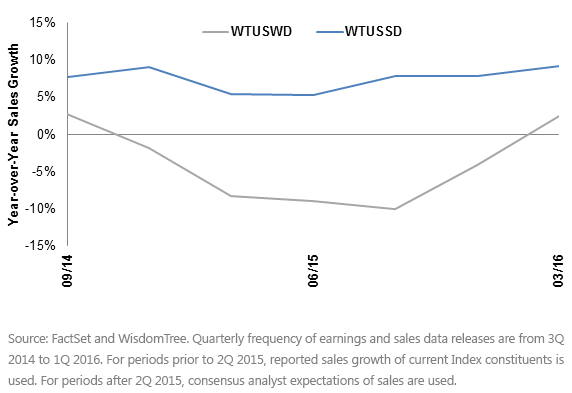Yellen Highlights Case for Local Economy Stocks


 For Local Economy Focus: Strong Dollar U.S. Equity Index
The trend in factor-based or so-called “smart beta” investment strategies has focused on common factors such as value, quality, momentum, and low volatility. WisdomTree believes currency can also be a critical factor explaining various market returns, even within the U.S. markets. While the real time results are relatively new—as just about four months of performance exist with these indexes being live—we are witnessing a wide divergence in the returns between the strong and weak dollar strategies.
Given the chart illustrating how long it takes for the dollar to feed into the competiveness of the exports, we still may be early in this cycle of performance for U.S. local economy companies.
1Source: Board of Governors of the Federal Reserve System press release, 9/17/15.
2Source: Jon Hilsenrath. “Fed’s Rate Decisions Hang on Dollar, Growth Concerns.” The Wall Street Journal. April 22, 2015.
3Subsequent to Index screening it is possible that a current constituent may spin off a subsidiary company that may be classified as an Energy or Materials firm. Spin off firms that remain within the Index do not get removed between Index rebalances due to their sector classification.
4Source: Factset consensus analyst expectations for current constituents of WTUSSD and WTUSWD Indexes as of 6/30/15 quarterly reporting.
For Local Economy Focus: Strong Dollar U.S. Equity Index
The trend in factor-based or so-called “smart beta” investment strategies has focused on common factors such as value, quality, momentum, and low volatility. WisdomTree believes currency can also be a critical factor explaining various market returns, even within the U.S. markets. While the real time results are relatively new—as just about four months of performance exist with these indexes being live—we are witnessing a wide divergence in the returns between the strong and weak dollar strategies.
Given the chart illustrating how long it takes for the dollar to feed into the competiveness of the exports, we still may be early in this cycle of performance for U.S. local economy companies.
1Source: Board of Governors of the Federal Reserve System press release, 9/17/15.
2Source: Jon Hilsenrath. “Fed’s Rate Decisions Hang on Dollar, Growth Concerns.” The Wall Street Journal. April 22, 2015.
3Subsequent to Index screening it is possible that a current constituent may spin off a subsidiary company that may be classified as an Energy or Materials firm. Spin off firms that remain within the Index do not get removed between Index rebalances due to their sector classification.
4Source: Factset consensus analyst expectations for current constituents of WTUSSD and WTUSWD Indexes as of 6/30/15 quarterly reporting.
Important Risks Related to this Article
Investments in currency involve additional special risks, such as credit risk and interest rate fluctuations.

Jeremy Schwartz has served as our Global Chief Investment Officer since November 2021 and leads WisdomTree’s investment strategy team in the construction of WisdomTree’s equity Indexes, quantitative active strategies and multi-asset Model Portfolios. Jeremy joined WisdomTree in May 2005 as a Senior Analyst, adding Deputy Director of Research to his responsibilities in February 2007. He served as Director of Research from October 2008 to October 2018 and as Global Head of Research from November 2018 to November 2021. Before joining WisdomTree, he was a head research assistant for Professor Jeremy Siegel and, in 2022, became his co-author on the sixth edition of the book Stocks for the Long Run. Jeremy is also co-author of the Financial Analysts Journal paper “What Happened to the Original Stocks in the S&P 500?” He received his B.S. in economics from The Wharton School of the University of Pennsylvania and hosts the Wharton Business Radio program Behind the Markets on SiriusXM 132. Jeremy is a member of the CFA Society of Philadelphia.

